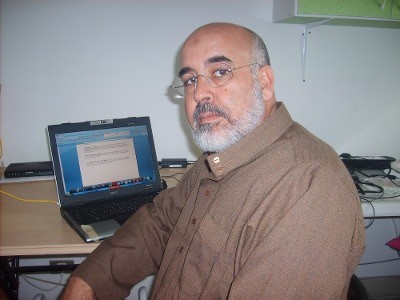


Professor Mounir Boukadoum, PhD.
Laboratoire Microélectronique-Prototypage,
University of Quebec at Montreal (UQAM)
Title:
Artificial Neural Networks for Engineering Analysis and Synthesis
Abstract:
Artificial neural networks (ANN) have received considerable attention as a means to imitate the human brain's resilience to
imprecise, fragmentary and/or noisy information, and ability to solve problems on the basis of analogy and generalization, as
opposed to using predefined models. The tutorial will start by discussing some limitations of the current formal approaches
for the study and design of complex systems, and how, by turning the problems to solve into classification or optimization ones,
a neural network approach may solve them. Then, an introduction to ANNs will be given, along with the techniques to design and
train them. Case studies in signal and image analysis and circuit synthesis will be presented for illustration.
Short Bio:
Mounir Boukadoum is professor of microelectronics engineering at The University of Quebec at Montreal (UQAM), Canada. He studied
physics in Algeria before switching to electrical engineering in the United States, with an emphasis on biomedical applications.
He holds a PhD degree in Electrical Engineering degree from The University of Houston, Texas. His current research covers the
applications of artificial intelligence and nature-inspired techniques to solve analysis and design problems, particularly in
relation to biomedical outcomes. Pr. Boukadoum is currently director of the Design and Fabrication of Microsystems research laboratory
at UQAM (COFAMIC), president of the IEEE Computational Intelligence Society's chapter in Montreal and executive member of the Quebec
Strategic Alliance for Microsystems research consortium (ReSMIQ). He is an active member of IEEE and member of three IEEE CAS conferences
steering committees. He is also a cofounder of the IEEE NEWCAS conference and Co-Chair of the 2018 edition in Montreal.

Professor Yahya Slimani, PhD.
Full Professor in Computer Science
ISAMM, University of Manouba (Tunisia)
Title:
Data Science: From Data to Knowledge
Abstract:
The Data Science (also known as data-driven science) is an interdisciplinary domain that combines mathematics, statistics and computer
science. It incorporates also techniques like machine learning, cluster analysis, data mining and visualization. The key word in data
science is not “data” but “science”.
Data Science intends to analyze and understand actual phenomena with "data". The aim of Data Science is to reveal the features or the
hidden structure of complicated natural, human and social phenomena with data from a different point of view from the established or
traditional theory and method. This point of view implies multidimensional, dynamic and flexible ways of thinking.
Data Science consists of three phases: (i) design for data; (ii) collection of data; and, (iii) analysis on data.
Analysis and storage are the two important challenges for organizations large and small. Firstly the amount of Big Data generated has
accelerated tremendously. Storing this data economically and securely is one of the top priorities of organizations.
Cloud computing is a technology paradigm that enables ubiquitous access to shared pools of configurable system resources and higher-level
services that can be rapidly provisioned with minimal management effort over a network. Cloud computing relies on sharing of resources to
achieve coherence and economy of scale. Data Science (Big Data) and Cloud computing essentially go hand in hand. With the increase in Big
Data, organizations are increasingly storing large sets of data online and need Data Scientists. A Data Scientist typically analyzes
different types of data that are stored in the Cloud.
The high volumes of data present a challenge to the Cloud environment. How to manage and secure the essence of this data rather than
just stacking it? It seems like Cloud computing and Big Data are an ideal combination for this. Together, they provide a solution which
is both scalable and accommodating for Big Data and business analytics.
The explosion of data leads to the issue of processing it. For example, social media alone generates a load of unstructured, chaotic data
like tweets, posts, photos, videos and blogs which can't be processed under a single category. With Big Data Analytics platforms like
Map/Reduce, Apache Hadoop, etc., structured and unstructured data can be processed.
Processing data and shifting it to Cloud organizations avails two benefits, including tackling large sets of data for decision making and
reducing the overall cost of infrastructure. With a huge demand in both the fields and billions of dollars of investment both are here to
stay.
Data-driven scientific discovery is a key emerging paradigm driving research innovation and industrial development in domains such as
business, social science, the Internet of Things and Cloud computing. The field encompasses the larger areas of data analytics, machine
learning, and managing Big Data, while related new scientific challenges range from data capture, creation, storage, search, sharing,
analysis, and visualization, to integration across heterogeneous, interdependent complex resources for real-time decision-making,
collaboration, and value creation.
Short Bio:
Yahya Slimani studied at the Computer Science Institute of Alger's (Algeria) from 1968 to 1973. He received the B.Sc. (Eng.), Dr Eng and
Ph.D degrees from the Computer Science Institute of Alger's (Algeria), University of Lille (French) and University of Oran (Algeria), in
1973, 1986 and 1993, respectively. He is currently Full Professor at the High Institute of Art and Multimedia of University of Manouba
(Tunisia). His research activities concern Knowledge Extraction, Data Mining, Parallel and Distributed Systems, Grid and Cloud computing,
and Information Retrieval. Pr. Slimani has published more than 150 papers from 1986 to 2017. He is a distinguished editorial board member
and reviewer for many scientific journals and international conferences.